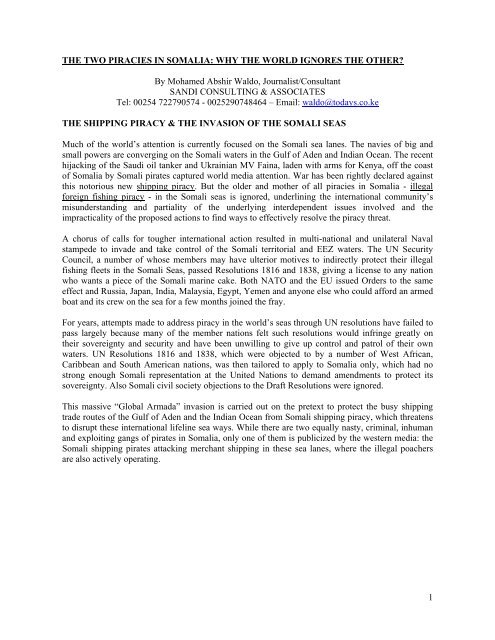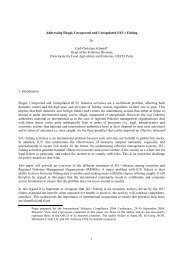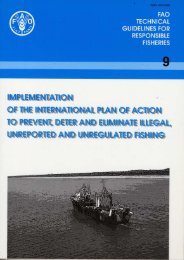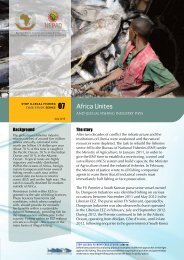The Two Piracies in Somalia - International MCS Network
The Two Piracies in Somalia - International MCS Network
The Two Piracies in Somalia - International MCS Network
Create successful ePaper yourself
Turn your PDF publications into a flip-book with our unique Google optimized e-Paper software.
THE TWO PIRACIES IN SOMALIA: WHY THE WORLD IGNORES THE OTHER?By Mohamed Abshir Waldo, Journalist/ConsultantSANDI CONSULTING & ASSOCIATESTel: 00254 722790574 - 0025290748464 – Email: waldo@todays.co.keTHE SHIPPING PIRACY & THE INVASION OF THE SOMALI SEASMuch of the world’s attention is currently focused on the Somali sea lanes. <strong>The</strong> navies of big andsmall powers are converg<strong>in</strong>g on the Somali waters <strong>in</strong> the Gulf of Aden and Indian Ocean. <strong>The</strong> recenthijack<strong>in</strong>g of the Saudi oil tanker and Ukra<strong>in</strong>ian MV Fa<strong>in</strong>a, laden with arms for Kenya, off the coastof <strong>Somalia</strong> by Somali pirates captured world media attention. War has been rightly declared aga<strong>in</strong>stthis notorious new shipp<strong>in</strong>g piracy. But the older and mother of all piracies <strong>in</strong> <strong>Somalia</strong> - illegalforeign fish<strong>in</strong>g piracy - <strong>in</strong> the Somali seas is ignored, underl<strong>in</strong><strong>in</strong>g the <strong>in</strong>ternational community’smisunderstand<strong>in</strong>g and partiality of the underly<strong>in</strong>g <strong>in</strong>terdependent issues <strong>in</strong>volved and theimpracticality of the proposed actions to f<strong>in</strong>d ways to effectively resolve the piracy threat.A chorus of calls for tougher <strong>in</strong>ternational action resulted <strong>in</strong> multi-national and unilateral Navalstampede to <strong>in</strong>vade and take control of the Somali territorial and EEZ waters. <strong>The</strong> UN SecurityCouncil, a number of whose members may have ulterior motives to <strong>in</strong>directly protect their illegalfish<strong>in</strong>g fleets <strong>in</strong> the Somali Seas, passed Resolutions 1816 and 1838, giv<strong>in</strong>g a license to any nationwho wants a piece of the Somali mar<strong>in</strong>e cake. Both NATO and the EU issued Orders to the sameeffect and Russia, Japan, India, Malaysia, Egypt, Yemen and anyone else who could afford an armedboat and its crew on the sea for a few months jo<strong>in</strong>ed the fray.For years, attempts made to address piracy <strong>in</strong> the world’s seas through UN resolutions have failed topass largely because many of the member nations felt such resolutions would <strong>in</strong>fr<strong>in</strong>ge greatly ontheir sovereignty and security and have been unwill<strong>in</strong>g to give up control and patrol of their ownwaters. UN Resolutions 1816 and 1838, which were objected to by a number of West African,Caribbean and South American nations, was then tailored to apply to <strong>Somalia</strong> only, which had nostrong enough Somali representation at the United Nations to demand amendments to protect itssovereignty. Also Somali civil society objections to the Draft Resolutions were ignored.This massive “Global Armada” <strong>in</strong>vasion is carried out on the pretext to protect the busy shipp<strong>in</strong>gtrade routes of the Gulf of Aden and the Indian Ocean from Somali shipp<strong>in</strong>g piracy, which threatensto disrupt these <strong>in</strong>ternational lifel<strong>in</strong>e sea ways. While there are two equally nasty, crim<strong>in</strong>al, <strong>in</strong>humanand exploit<strong>in</strong>g gangs of pirates <strong>in</strong> <strong>Somalia</strong>, only one of them is publicized by the western media: theSomali shipp<strong>in</strong>g pirates attack<strong>in</strong>g merchant shipp<strong>in</strong>g <strong>in</strong> these sea lanes, where the illegal poachersare also actively operat<strong>in</strong>g.1
As EU closed much of its fish<strong>in</strong>g waters for 5 to 15 years for fish regeneration, as Asia over fishedits seas, as <strong>in</strong>ternational demand <strong>in</strong>creases for nutritious mar<strong>in</strong>e products and as the fear ofworldwide food shortage grows, the rich, uncontrolled and unprotected Somali seas became thetarget of the fish<strong>in</strong>g fleets of many nations. Surveys by UN, Russian and Spanish assessors justbefore the collapse of the Barre Regime <strong>in</strong> 1991 estimated that 200,000 tones of fish a year could becaught by both artisanal and <strong>in</strong>dustrial fisheries and this is the objective of the <strong>in</strong>ternational fish<strong>in</strong>gracket<strong>The</strong>re is no doubt that the actions of the shipp<strong>in</strong>g pirates are reprehensible and this paper does notseek to justify or expla<strong>in</strong> their odious actions. <strong>The</strong>y must be stopped. But the notorious shipp<strong>in</strong>gpiracy is unlikely to be resolved without simultaneously attend<strong>in</strong>g to the fraudulent IUU piracy, too.b) <strong>The</strong> Orig<strong>in</strong> of the Somali Piracy War<strong>The</strong> orig<strong>in</strong> of the two piracies goes back to 1992 after the fall of the Gen. Siyad Barre regime and thedis<strong>in</strong>tegration of the Somali Navy and Police Coastguard services. Follow<strong>in</strong>g severe draughts <strong>in</strong>1974 and 1986, tens of thousands of nomads, whose livestock were wiped out by the draughts, werere-settled all along the villages on the long, 3300kms Somali coast. <strong>The</strong>y developed <strong>in</strong>to large fish<strong>in</strong>gcommunities whose livelihood depended <strong>in</strong>shore fish<strong>in</strong>g. From the beg<strong>in</strong>n<strong>in</strong>gs of the civil war <strong>in</strong><strong>Somalia</strong> (as early as 1991/1992) illegal fish<strong>in</strong>g trawlers started to trespass and fish <strong>in</strong> Somali waters,<strong>in</strong>clud<strong>in</strong>g the 12-mile <strong>in</strong>shore artisanal fish<strong>in</strong>g waters. <strong>The</strong> poach<strong>in</strong>g vessels encroached on the localfishermen’s grounds, compet<strong>in</strong>g for the abundant rock-lobster and high value pelagic fish <strong>in</strong> thewarm, up-swell<strong>in</strong>g 60kms deep shelf along the tip of the Horn of Africa.<strong>The</strong> piracy war between local fishermen and IUUs started here. Local fishermen documented casesof trawlers pour<strong>in</strong>g boil<strong>in</strong>g water on the fishermen <strong>in</strong> canoes, their nets cut or destroyed, smallerboats crushed, kill<strong>in</strong>g all the occupants, and other abuses suffered as they tried to protect theirnational fish<strong>in</strong>g turf. Later, the fishermen armed themselves. In response, many of the foreign fish<strong>in</strong>gvessels armed themselves with more sophisticated weapons and began to overpower the fishermen. Itwas only a matter of time before the local fishermen reviewed their tactics and modernized theirhardware. This cycle of warfare has been go<strong>in</strong>g on from 1991 to the present. It is nowdevelop<strong>in</strong>g <strong>in</strong>to fully fledged, two-pronged illegal fish<strong>in</strong>g and shipp<strong>in</strong>g piracy conflicts.Accord<strong>in</strong>g to the High Seas Task Force (HSTF), there were over 800 IUUs fish<strong>in</strong>g vessels <strong>in</strong> Somaliwaters at one time <strong>in</strong> 2005 tak<strong>in</strong>g advantage of <strong>Somalia</strong>’s <strong>in</strong>ability to police and control its ownwaters and fish<strong>in</strong>g grounds. <strong>The</strong> IUUs, which are estimated take out more than $450 million <strong>in</strong> fishvalue out of <strong>Somalia</strong> annually, neither compensate the local fishermen, pay tax, royalties nor do theyrespect any conservation and environmental regulations – norms associated with regulated fish<strong>in</strong>g. Itis believed that IUUs from the EU alone take out of the country more than five times the value of itsaid to <strong>Somalia</strong> every year.3
Illegal foreign fish<strong>in</strong>g trawlers which have be<strong>in</strong>g fish<strong>in</strong>g <strong>in</strong> <strong>Somalia</strong> s<strong>in</strong>ce 1991 are mostly owned byEU and Asian fish<strong>in</strong>g companies – Italy, France, Spa<strong>in</strong>, Greece, Russia, Brita<strong>in</strong>, Ukra<strong>in</strong>e, Japan,South Korea, Taiwan, India, Yemen, Egypt and many others. Illegal vessels captured on the Somalicoast by Somali fishermen dur<strong>in</strong>g 1991 and 1999 <strong>in</strong>cluded Taiwanese trawlers Yue Fa No. 3 andChian Yue<strong>in</strong> No.232, FV Shuen Kuo No.11; MV Airone, MV De Giosa Giuseppe and MV Antonietta,all 3 Italian vessels registered <strong>in</strong> Italy; MV Bahari H<strong>in</strong>di, Kenyan registered but owned and managedby Marship Co. of Mombasa. A number of Italian registered SHIFCO vessels, Korean and Ukra<strong>in</strong>iantrawlers, Indian, Egyptian and Yemeni boats were also captured by fishermen and ransoms ofdifferent sizes paid for their release. Many Spanish se<strong>in</strong>ers, frequent violators of the Somali fish<strong>in</strong>ggrounds, managed to evade capture at various times.Accord<strong>in</strong>g to a report <strong>in</strong> the Daily Nation of October 14, 2004, even Kenyan registered fish<strong>in</strong>gvessels are known to have participated <strong>in</strong> the rape of the Somali fish<strong>in</strong>g grounds. In October 2004,Mr Andrew Mwangura, Kenya Coord<strong>in</strong>ator of the Seafarers Assistance Program (SAP) asked theKenya Government to help stop illegal fish<strong>in</strong>g <strong>in</strong> <strong>Somalia</strong>. “S<strong>in</strong>ce <strong>Somalia</strong> has been withoutgovernment for more than 11 years, Kenya trawlers have been illegally fish<strong>in</strong>g along the country’sterritorial waters contrary to the UNCLOS and the FAO <strong>in</strong>struments, he said. SAP further reportedthat 19 Kenyan registered fish<strong>in</strong>g vessels also operated illegally <strong>in</strong> the <strong>Somalia</strong> waters.In arrangements with Somali warlords, new companies were formed abroad for bogus fish<strong>in</strong>glicens<strong>in</strong>g purposes. Jo<strong>in</strong>tly owned mafia Somali-European companies set up <strong>in</strong> Europe and Arabiaworked closely with Somali warlords who issued them fake fish<strong>in</strong>g “licenses” to any foreign fish<strong>in</strong>gpirate will<strong>in</strong>g to plunder the Somali mar<strong>in</strong>e resources. UK and Italy based African and Middle EastTrad<strong>in</strong>g Co. (AFMET), PALMERA and UAE based SAMICO companies were some of the corruptvehicles issu<strong>in</strong>g such counterfeit licenses as well as front<strong>in</strong>g for the warlords who shared the loot.Among technical advisors to the Mafia companies – AFMET, PALMIRA & SAMICO - weresupposedly reputable firms like MacAllister Elliot & Partners of the UK. Warlords Gen. MohamedFarah Aidiid, Gen. Mohamed Hersi Morgan, Osman Atto and Ex-President Ali Mahdi Mohamedofficially and <strong>in</strong> writ<strong>in</strong>g gave authority to AFMET to issue fish<strong>in</strong>g “licenses”, which local fishermenand mar<strong>in</strong>e experts call it simply a “deal between thieves”. Accord<strong>in</strong>g to Africa Analysis ofNovember 13, 1998, AFMET alone “licensed” 43 se<strong>in</strong>ers (mostly Spanish, at $30,000 per 4-monthseason. Spanish Pesca Nova was “licensed” by AFMET while French Cobracaf group got theirs fromSAMICO at a much discounted rate of $15,000 per season per vessel.Not to be outdone, <strong>in</strong> October 1999 Puntland Adm<strong>in</strong>istration, gave carte blanche to another Mafiagroup known as PIDC, registered <strong>in</strong> Oman to fish, issue licenses and to police the Puntland coast.PIDC <strong>in</strong> turn contracted Hart Group of the UK and together they pillaged the Somali fish<strong>in</strong>g groundswith vengeance, mak<strong>in</strong>g over $20 million profit with<strong>in</strong> two years. <strong>The</strong> deal was to split the profitsbut PIDC failed to share the spoils with Puntland adm<strong>in</strong>istration, result<strong>in</strong>g <strong>in</strong> revocation of theirlicenses. Hav<strong>in</strong>g reneged on their part of the deal, PIDC/Hart quit the country with their handsomelywon chips.4
Describ<strong>in</strong>g the activity as "economic terrorism", Somali fishermen told IRIN that the poachers werenot only plunder<strong>in</strong>g the fish but were also dump<strong>in</strong>g rubbish and oil <strong>in</strong>to the sea. <strong>The</strong>y compla<strong>in</strong>ed theSomali government was not strong enough to stop it. "We want the <strong>in</strong>ternational agencies to help usdeal with this problem," said Husse<strong>in</strong>. "If noth<strong>in</strong>g is done about them, there soon won't be much fishleft <strong>in</strong> our coastal waters." Musse Gabobe Hassan and Mohamud Hassan Tako of the MogadishuMaritime and Fisheries Institute accuse foreign ships of illegal fish<strong>in</strong>g and dump<strong>in</strong>g of hazardouswaste <strong>in</strong> Somali waters. “<strong>Somalia</strong>’s coastal communities who eke their livelihood from the sea areappeal<strong>in</strong>g to the <strong>in</strong>ternational community for help stop the illegal fish<strong>in</strong>g fleets from both thedeveloped and develop<strong>in</strong>g countries that are robb<strong>in</strong>g our mar<strong>in</strong>e wealth and destroy<strong>in</strong>g its habitats”,they added.Like the UN Security Council, Chatham House, an <strong>International</strong> Affairs Th<strong>in</strong>k-Tank, <strong>in</strong> a muchpublicized recent Paper on piracy <strong>in</strong> <strong>Somalia</strong> failed to present a balanced view of the issue andconcentrated on the shipp<strong>in</strong>g piracy side of the co<strong>in</strong>. Roger Middleton, the author of the Paper,however, mentions <strong>in</strong> pass<strong>in</strong>g that European, Asian and African (Egypt and Kenya) illegally fish <strong>in</strong>the <strong>Somalia</strong> waters. In ignor<strong>in</strong>g the pr<strong>in</strong>cipal IUU factor, the orig<strong>in</strong> and the purpose of the shipp<strong>in</strong>gpiracy, UN and Roger Middleton seem to be either misled or pressured to take this one-sided courseby powerful <strong>in</strong>terests who want to cover up and protect the profitable bus<strong>in</strong>ess of illegal fish<strong>in</strong>g.<strong>The</strong>se crises of the illegal fish<strong>in</strong>g, waste dump<strong>in</strong>g, warlords/mafia deals and the loud compla<strong>in</strong>ts ofthe Somali fishermen and civil society have been known to UN agencies and <strong>in</strong>ternationalorganizations all along. <strong>The</strong> UN Agencies and organizations, which have been fully aware of thesecrises, often expressed concern and lamentations but never took any positive action aga<strong>in</strong>st thesecrim<strong>in</strong>al activities. It appears as if they have also failed to <strong>in</strong>form the UN Security Council of thistragedy before it passed its resolutions 1816 and 1838 early this year.Mr. Ould Abdalla, UN Secretary General Special Envoy for <strong>Somalia</strong>, who should know better,cont<strong>in</strong>ued to condemn Somali shipp<strong>in</strong>g piracy <strong>in</strong> a number of press statements and rightly so thourghbiased. In his latest Press Statement of 11/11/08 on the subject matter, he warmly welcomed theagreement by European Union member states to send ships to combat piracy off <strong>Somalia</strong>. “I amextremely pleased by the EU’s decision,” said Mr Ould-Abdallah. “Piracy off the Somali coast ispos<strong>in</strong>g a serious threat to the freedom of <strong>in</strong>ternational navigation and regional security”. But heforgot to condemn fish<strong>in</strong>g piracy, mention the Somali fish<strong>in</strong>g communities’ livelihood security or topropose concrete actions to deal with the two <strong>in</strong>ter-related piracies, which are like the two sides ofthe same co<strong>in</strong>.An FAO study, <strong>Somalia</strong>’s Fishery Review by Frans Teutscher, Nov. 11, 2005, states, “In the absenceof legal framework and/or for capacities for monitor<strong>in</strong>g, control and surveillance, extensive illegal,unreported and unregulated (IUU) is tak<strong>in</strong>g place and considerable quantities of non-targeted bycatch are discarded because they cannot presently be utilized”. <strong>The</strong> report said that the foreign IUUsmaximize their catch by fish<strong>in</strong>g throughout the year without regard to the wider mar<strong>in</strong>e ecosystem,not respect<strong>in</strong>g fish and crustacean spawn<strong>in</strong>g periods or irreparable damage done by their massivedrift nets and use of explosives or the loss of local fishermen’s livelihood.6
In a letter to the SSDF dated January 1998, Mr. Dom<strong>in</strong>ic Langenbacher, UNDP <strong>Somalia</strong> ResidentRepresentative, expressed his apprehension of the danger posed to the Somali mar<strong>in</strong>e resources andenvironment by foreign vessels. “<strong>The</strong> concern of the <strong>in</strong>ternational community is that the threat oftoxic waste dump<strong>in</strong>g, pirate fish<strong>in</strong>g by foreign vessels and over fish<strong>in</strong>g of Somali stocks couldadversely, and perhaps permanently, affect the ecosystem of the entire region” he said.“Furthermore, <strong>Somalia</strong> currently has no provision to deal with potential oil spills or other mar<strong>in</strong>edisasters and has no capability to monitor and control her coastal waters and, if necessary, providesea search or rescue operations”, he added.Dr Mustafa Tolba, former Executive Director of UNEP, confirmed that Italian companies weredump<strong>in</strong>g lethal toxic waste <strong>in</strong> <strong>Somalia</strong> which might “contribute to the loss of life <strong>in</strong> the alreadydevastated country”. Dr Tolba added that the shipment of the toxic wastes from Italy that could alsoaggravate the destruction of the ecosystem <strong>in</strong> <strong>Somalia</strong> “earned a company, which ships the waste,between 2 to 3 million dollars <strong>in</strong> profits”, (Sunday Nation, 06/09/92).In a proposal for action to the UNDP for <strong>Somalia</strong> <strong>in</strong> early 1990s, Mr. John Laurence, a fisheryconsultant with PanOcena Resources Ltd, reports the catastrophic and heartbreak<strong>in</strong>g illegal foreignexploitation of the Somali seas. “With regards to the controlled exploitation of the Somali deep seafish<strong>in</strong>g grounds by the huge foreign factory ships and vessels it is our op<strong>in</strong>ion that the UN must get<strong>in</strong>volved. This area is recognized as one of the 5 richest fish<strong>in</strong>g zones of the world and previouslyunexploited. It is now be<strong>in</strong>g ravaged, unchecked by any authority, and if it cont<strong>in</strong>ues to be fished atthe level it is at present stocks are <strong>in</strong> danger of be<strong>in</strong>g depleted …. So, a world resource is underserious threat and the UN is sitt<strong>in</strong>g back do<strong>in</strong>g noth<strong>in</strong>g to prevent it”. “Secondly, the Somali peopleare be<strong>in</strong>g denied any <strong>in</strong>come from this resource due to their <strong>in</strong>ability to license and police the zone”and “ the UN is turn<strong>in</strong>g a bl<strong>in</strong>d eye to the activities of the fish<strong>in</strong>g vessels whose operators are notpay<strong>in</strong>g their dues; which <strong>in</strong> any other circumstances would be enforced by any <strong>in</strong>ternational court oflaw”, argues Laurence.Surpris<strong>in</strong>gly, the UN disregarded its own f<strong>in</strong>d<strong>in</strong>gs of the violations, ignored the Somali and<strong>in</strong>ternational appeals to act on the cont<strong>in</strong>ued ravag<strong>in</strong>g of the Somali mar<strong>in</strong>e resources and dump<strong>in</strong>gof hazardous wastes. Instead, the UN and the big powers, <strong>in</strong>vok<strong>in</strong>g Charter IIV of the UN Charter,decided to “enter the territorial waters of <strong>Somalia</strong>……and ..…use, with<strong>in</strong> the territorial waters of<strong>Somalia</strong> ….all necessary means to identify, deter, prevent, and repress acts of piracy and armedrobbery, <strong>in</strong>clud<strong>in</strong>g but not limited to board<strong>in</strong>g, search<strong>in</strong>g, and seiz<strong>in</strong>g vessels engaged <strong>in</strong> orsuspected of engag<strong>in</strong>g <strong>in</strong> acts of piracy or armed robbery, and to apprehend persons engaged <strong>in</strong> suchacts with a view to such persons be<strong>in</strong>g prosecuted” (Resolution 1816).It should be noted that there is no mention of the illegal fish<strong>in</strong>g piracy, hazardous waste dump<strong>in</strong>g orthe plight of the Somali fishermen <strong>in</strong> the UN Resolutions. Justice and fairness have been overlooked<strong>in</strong> these tw<strong>in</strong> problems of FISHING PIRACY and SHIPPING PIRACY.7
<strong>The</strong> Illegality and Impracticality of the actions of the UN, NATO and EUThis Global Armada is <strong>in</strong> the Somali waters illegally as it is not approved by the Somali TransitionalFederal Parliament (TFP). It is also unlikely it will achieve its stated objectives to curb the shipp<strong>in</strong>gpiracy as it is now conceived. <strong>The</strong> TFP and the members of the European Parliament rejected theseUN and European decisions to police the Somali seas (both the Indian Ocean and the Gulf of Aden)as both illegal and unworkable. At a Press Conference <strong>in</strong> Nairobi on October 18 th 2008, the DeputySpeaker of the TFP, Mohamed Omar Dalha, termed the deployment of foreign warships to thecountry's coast to fight piracy as <strong>in</strong>vasion of its sovereignty and asked the foreign warships to “moveout of the Somali waters”. <strong>The</strong> Speaker questioned the <strong>in</strong>tent of the deployment and suggested thatthe powers <strong>in</strong>volved had a hidden agenda. He said if these powers were genu<strong>in</strong>e <strong>in</strong> curb<strong>in</strong>g the piracythey would have supported and empowered the Somali authorities, who would be more effective <strong>in</strong>stopp<strong>in</strong>g the menace. “If the millions of dollars given to the pirates or wasted <strong>in</strong> the warship polic<strong>in</strong>gthere were given to us, we would have elim<strong>in</strong>ated this curse”, he said.Several EU members of parliament (MEPs) called the EU naval mission to be deployed aga<strong>in</strong>stpirates off the coasts of <strong>Somalia</strong> as a "military nonsense," "morally wrong" and hav<strong>in</strong>g "no<strong>in</strong>ternational legal basis." German green MEP Angelika Beer underl<strong>in</strong>ed the lack of <strong>in</strong>ternational lawto susta<strong>in</strong> the proposed European Security and Defense Policy (ESDP) mission. "<strong>The</strong>re is no clarityto the limitations of this mandate. Will the EU be able to s<strong>in</strong>k ships and arrest pirates?" she asked.Portuguese socialist MEP Ana Maria Gomes gave a fiery speech on the "moral problem" of the EUmission, which, <strong>in</strong> her op<strong>in</strong>ion, is only about "protect<strong>in</strong>g oil tankers." "Nobody gives a damn aboutthe people <strong>in</strong> <strong>Somalia</strong> who die like flies," she said (EU Observer of 15 th October 2008).8
Conclusion<strong>The</strong> EU, NATO and US Navies can, of course, Rambo and obliterate the fishermen pirates and theirsupport<strong>in</strong>g coastal communities but that would be illegal, crim<strong>in</strong>al act. Yet, it may temporarilyreduce the <strong>in</strong>tensity of the shipp<strong>in</strong>g piracy but it would not result <strong>in</strong> a long-term solution of theproblem. <strong>The</strong> risk of loss of life of foreign crews and ecological impact of major oil spill would be amar<strong>in</strong>e catastrophe of gigantic proportions for the whole coastal regions of East Africa and the Gulfof Aden. In their current operations, the Somali fishermen pirates genu<strong>in</strong>ely believe that they areprotect<strong>in</strong>g their fish<strong>in</strong>g grounds (both 12-mile territorial and EEZ waters). <strong>The</strong>y also feel that theyexact<strong>in</strong>g justice and compensation for the mar<strong>in</strong>e resources stolen and the destroyed ecosystem bythe IUUs. And their th<strong>in</strong>k<strong>in</strong>g is shared and fully supported by the coastal communities, whoseprotectors and providers they became.<strong>The</strong> matter needs careful review and better understand<strong>in</strong>g of the local environment. <strong>The</strong> piracy isbased on local problems and it requires a number of comprehensive jo<strong>in</strong>t local and external partnersapproaches. Firstly, practical and last<strong>in</strong>g solution lies <strong>in</strong> jo<strong>in</strong>tly address<strong>in</strong>g the tw<strong>in</strong> problems of theshipp<strong>in</strong>g piracy and the illegal fish<strong>in</strong>g piracy, the root cause of the crisis. Secondly, the national<strong>in</strong>stitutional crisis should be reviewed along with the piracy issues. Thirdly, local <strong>in</strong>stitutions shouldbe <strong>in</strong>volved and supported, particularly by help<strong>in</strong>g to form coastguards, tra<strong>in</strong><strong>in</strong>g and coastguardfacilities. <strong>The</strong>se may sound ask<strong>in</strong>g too much to donors and UN agencies. But we should ask what itmeant those who paid tens of millions dollars of ransom and their loved ones held hostage formonths. Fourthly, a jo<strong>in</strong>t Somali and UN agency like the present ICAO for the Somali airspaceshould be considered.Oo000oO9
















